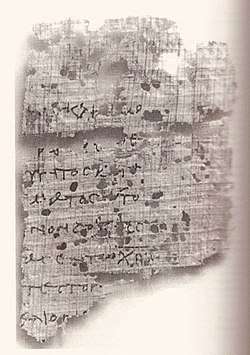Loading AI tools
Chapter of the New Testament From Wikipedia, the free encyclopedia
Ephesians 1 is the first chapter of the Epistle to the Ephesians in the New Testament of the Christian Bible. Traditionally, it is believed to have been written by Apostle Paul while he was in prison in Rome (around AD 62), but more recently, it has been suggested that it was written between AD 80 and 100 by another writer using Paul's name and style.[1][2] This chapter contains the greeting, followed by a section about "The Blessing of God" and Paul's prayer.[3]
| Ephesians 1 | |
|---|---|
 A fragment showing Ephesians 1:11-13 on Papyrus 92 from ca. AD 300. | |
| Book | Epistle to the Ephesians |
| Category | Pauline epistles |
| Christian Bible part | New Testament |
| Order in the Christian part | 10 |
The original text was written in Koine Greek. This chapter is divided into 23 verses.
Some early manuscripts containing the text of this chapter are:

The greeting of this epistle follows the typical of Paul's usual address format, "X to Y, greeting" (in Greek style) or "peace" (in Jewish style).[3]
While English translations indicate that the letter was addressed to "the saints who are in Ephesus", the words "in Ephesus" do not appear in Papyrus 46, one of the earliest manuscripts containing this epistle.[6][lower-alpha 1] See the section on the place, date, and purpose of the writing of the letter in the article on Epistle to the Ephesians for more details.
Theologian James Dunn considers this section "one of the most beautiful passages in the Bible" among Christian praise, "unlike anything else in Pauline letters".[3] The Greek text of this part can be punctuated as a single sentence.[3] It contains a four-dimensional blessing, sketched a circle starting from God and directing to God as the source and resource of it, reaching from the time "before the foundation of the world" (verse 4), into the revelation of the divine mystery (verse 9), until the end of time ("the fullness of time") to "sum up everything in Christ" (verse 10) with "the Spirit as the guarantee" of "the final redemption of God's own possession" (verse 14).[10]
An rhetorical antanaclasis: God has blessed us in one sense, we bless Him in another;[12] an "ingenious correlation of the passive εὐλογητός (eulogētos) and the active εὐλογήσας (eulogēsas)".[13]
This section contains the thanksgiving and prayer for the receivers of this epistle, concerning their "faith in the Lord Jesus" and the love of all believers, followed by a hope in "the working of the great might of God".[22]
Lutheran theologian Johann Bengel suggests that "Paul made mention of all the churches in his prayers" (or at least of all the churches with which he was associated) as is similarly stated in Colossians 1:3 and 1:9.[12]
Seamless Wikipedia browsing. On steroids.
Every time you click a link to Wikipedia, Wiktionary or Wikiquote in your browser's search results, it will show the modern Wikiwand interface.
Wikiwand extension is a five stars, simple, with minimum permission required to keep your browsing private, safe and transparent.